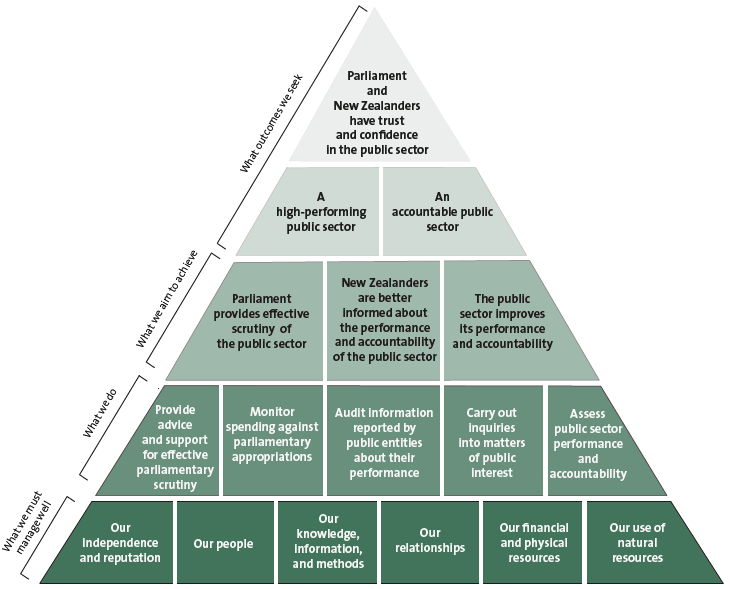Introduction
Please refer to the latest update of The Auditor-General's strategic intentions to 2025.
The Auditor-General's strategic intentions to 2025 (our strategic intentions) sets out the objectives we will focus on for the next eight years. The objectives are ambitious. We want to play our part so that the public sector is well positioned to meet the needs of New Zealanders in the second quarter of the 21st century.
Our role and purpose
The Auditor-General is an Officer of Parliament. The role is an important part of the constitutional framework in New Zealand. The role exists because the ultimate authority for all public sector activity stems from Parliament.
The public sector is accountable to, and therefore subject to the scrutiny of, Parliament (and, for local government, accountable to local communities). Parliament seeks independent assurance about the use of the resources and rights it has authorised, as part of its own scrutiny of governmental activity in New Zealand. That independent assurance comes from the Auditor-General.
The purpose of the Auditor-General's work is to:
Give Parliament and New Zealanders an independent view about public sector performance and accountability.
The outcome we seek
The ultimate outcome we are seeking is that Parliament and New Zealanders can have trust and confidence in the public sector. For this to happen, the public sector has to perform well and provide reliable, meaningful, and timely information so it can be held accountable. Everything we do is directed towards achieving this outcome (see our outcomes framework in Figure 1).
We play an important role in influencing lasting improvements in public sector performance and accountability. To do this, our Office must be seen as reliable and trustworthy. The principles that matter most to us are transparency, fairness, integrity, and trust.
Our vision is that, through our work, we will contribute to:
A high-performing and trusted public sector.
No other organisation, public or private, has the overview of the whole public sector that we have. As the auditor of every public entity, we have a role with each organisation – and we can also see the overall performance and accountability of the entire public sector in New Zealand. This gives us a unique position from which to influence improvements in the public sector's performance and the public management system in which it operates.
Figure 1
Our outcomes framework

What we do, and how we organise and fund our work
The Auditor-General is the auditor of about 3700 public entities. This audit work is carried out by either the Auditor-General's own audit service provider, Audit New Zealand, or private sector audit firms. The decision about who does each audit on the Auditor-General's behalf depends on a range of circumstances and requirements, including the capabilities needed for certain audits.
About half of this work (by value) is allocated to private sector firms. This arrangement lets the Auditor-General allocate work to the provider best suited for each audit, and keeps Audit New Zealand focused on being a high-performing audit service provider.
The annual audits are funded by fees charged to each audited entity, which are decided by the Auditor-General after consultation with the entity. This also creates some constructive tension to ensure value for money.
As well as annual audits (which make up nearly 90% of our work), the Auditor-General can carry out performance audits, inquire into how a public entity uses its resources, and study other matters affecting the public sector.
The Auditor-General is supported by staff in the Office of the Auditor-General. They carry out policy, strategy, and sector oversight work; carry out performance audits and inquiries; provide advice to parliamentary select committees; and allocate and oversee work done by audit service providers.
The Office is funded through Vote Audit, which has two output appropriations – Statutory Auditor Function and Audit and Assurance Services.
The Statutory Auditor Function appropriation is largely Crown-funded and includes two classes of outputs – Performance Audits and Inquiries and Supporting Accountability to Parliament. This mainly funds the functions carried out in the Office of the Auditor-General.
The Audit and Assurance Services appropriation is for carrying out audits and related assurance services as required or authorised by different laws. This appropriation is largely funded by audit fees collected directly from public entities.

